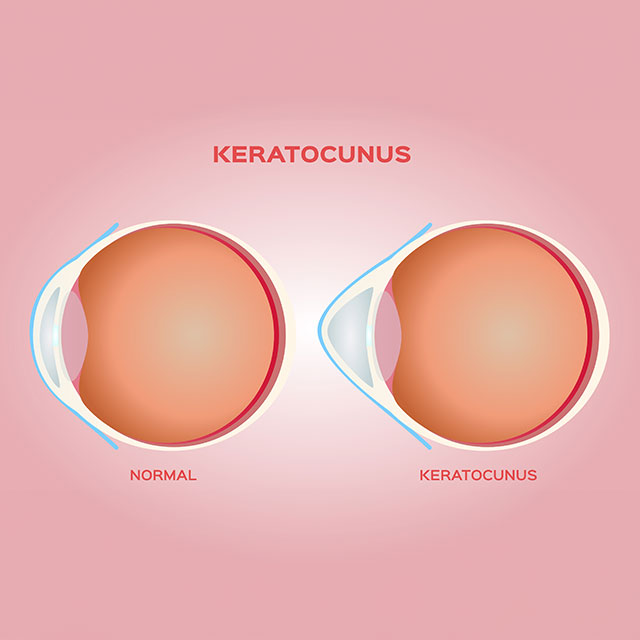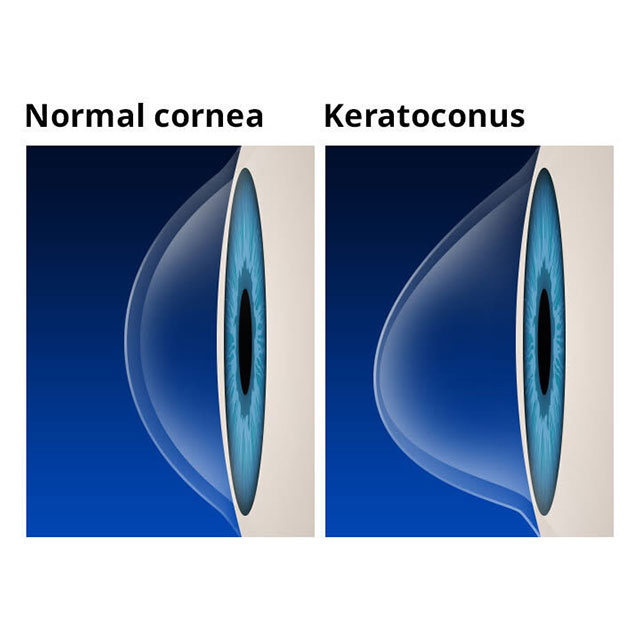
What is Keratoconus?
Kerataconus is a condition that affects the cornea, the clear front part of the eye. Although it might sound intimidating, understanding keratoconus and its available treatments can help you or someone you know find proper treatment and maintain clear vision.
At Fishbaugh Family Eye Care, we help patients with keratoconus achieve clear, comfortable, and healthy vision using scleral contact lenses. Contact us to schedule your appointment if you or someone you love has been diagnosed with a corneal condition.
Keratoconus is an eye condition where the cornea, which is normally round and dome-shaped, becomes thin and develops a cone-like bulge. This irregular shape affects the cornea's ability to properly focus light onto the retina, resulting in blurry and distorted vision.

Causes of Keratoconus

While the exact cause of keratoconus is still not fully understood, it is believed to be a combination of genetic and environmental factors. If you have a family history of keratoconus, you may be at a higher risk of developing the condition. Frequent eye rubbing, chronic eye irritation, and certain underlying conditions, such as allergies, can also contribute to its development.
Symptoms of Keratoconus

Keratoconus typically starts during the teenage years and gradually progresses over time. The following symptoms may indicate the presence of keratoconus:
- Blurred or distorted vision: Objects may appear distorted, and it can become increasingly difficult to see clearly even with corrective lenses.
- Increased sensitivity to light: Bright lights may cause discomfort and glare.
- Halos and ghosting: Seeing halos or ghosting around lights, especially at night.
- Eye strain and fatigue: Eyes may feel tired or strained, especially after focusing on objects for extended periods.
Treatment Options for Keratoconus

Several treatment and corrective options are available for keratoconus. The choice of treatment depends on the severity of the condition and the individual's specific needs. The options include:
- Glasses or contact lenses: In the early stages, regular glasses or soft contact lenses may be sufficient to correct vision. However, as the condition progresses, specialized lenses become necessary.
- Hybrid lenses: Hybrid lenses combine the features of rigid and soft lenses. They have a rigid center for clear vision and a soft outer ring for increased comfort.
- Corneal cross-linking (CXL): This treatment aims to strengthen the cornea using a combination of riboflavin eye drops and ultraviolet light. CXL can help slow down the progression of keratoconus.
- Scleral lenses: Scleral lenses are becoming increasingly popular for managing keratoconus due to their unique design, comfort, and optical clarity.
Scleral Lenses: A Promising Solution at Fishbaugh Family Eye Care
Scleral lenses are large, rigid lenses that vault over the cornea, resting on the sclera (the white part of the eye). Unlike traditional contact lenses, which sit directly on the cornea, scleral lenses create a tear-filled space between the lens and the cornea. This reservoir of fluid acts as a protective barrier, keeping the cornea hydrated and providing a smooth optical surface for improved vision.

How Do Scleral Lenses Work?


When a person with keratoconus wears scleral lenses, the lens creates a uniform surface over the irregular cornea. This helps to reduce distortions and provide clearer vision. The liquid reservoir also moisturizes the cornea, reducing dryness and discomfort. In fact, some studies have found that patients with keratoconus who consistently wear scleral lenses have a much lower chance of needing a corneal transplant. This is due largely to the fact that scleral lenses protect the cornea and shield it from irritation due to blinking and other factors.
Scleral lenses are custom-made for each individual's eye shape and condition. They are highly durable and can usually be worn for longer periods without discomfort.
Effective Keratoconus Treatment at Fishbaugh Family Eye Care
Living with keratoconus can be challenging, but with the right understanding and treatment, individuals can achieve improved vision and a better quality of life. While various treatment options exist, scleral lenses have gained recognition for their ability to address the unique needs of those with keratoconus.
If you suspect you may have keratoconus or know someone who does, consult an eye care professional at Fishbaugh Family Eye Care who can guide you through the available treatment options, including the potential benefits of scleral lenses. Remember, early detection and intervention are key to managing this condition effectively.
Keratoconus FAQs
Currently, there is no known way to prevent keratoconus. However, avoiding excessive eye rubbing and taking steps to maintain good overall eye health may help reduce the risk of progression.
While it may take some time to adjust to wearing scleral lenses, they are designed for comfort and improved vision. The liquid reservoir between the lens and the cornea helps keep the eyes hydrated, reducing discomfort often associated with other types of lenses.
Your Keratoconus Treatment Specialist in Lima

Meet our Eye Doctors

- Monday 8:30 am - 5:00 pm
- Tuesday 8:30 am - 5:00 pm
- Wednesday 8:30 am - 5:00 pm
- Thursday 8:30 am - 5:00 pm
- Friday 8:30 am - 2:00 pm
- Saturday Closed
- Sunday Closed
- Aetna
- Allwell
- Allied
- AlwaysCare
- Ambetter
- Amerihealth
- Anthem BCBS Medicaid
- Anthem Blue Cross Blue Shield
- Anthem Medicare Advantage Plans
- AARP
- Aarp Medicare Advantage
- AARP Supplement Plans
- Avesis
- BCBS Federal Employee Program
- Blue Cross Blue Shield
- Blue Advantage
- Blue View Vision
- Buckeye Health Plan
- Care Credit
- Care Source
- ChampVA
- Cigna
- Cigna Vision
- Davis Vision
- Devoted Health Plans
- Delta Vision
- Eyefinity
- Eye Med
- Eyemed Vision Care
- Golden Rule
- Health Alliance Insurance
- Health Partners
- Humana
- Humana Gold Plus
- Humana Medicare
- Humana Vision (VCP)
- Humana PPO Only
- Manhattan Life
- Medicaid
- March Vision Care
- Med Ben
- Medical Mutual
- Medicare
- Metlife
- Molina Healthcare
- Medicare Supplement
- Mutual of Omaha
- National Vision Administration (NVA)
- Opticare
- Paramount
- Premier Eye Care
- Railroad Medicare Beneficiaries
- Spectera
- Superior Vision by Versant Health
- Tricare
- Trustmark
- Superior Health Plan
- UMR
- United Healthcare
- United Health Care Community Plan
- VSP
- VSP Premier Edge
- Wellcare
- WellCare ambetter

